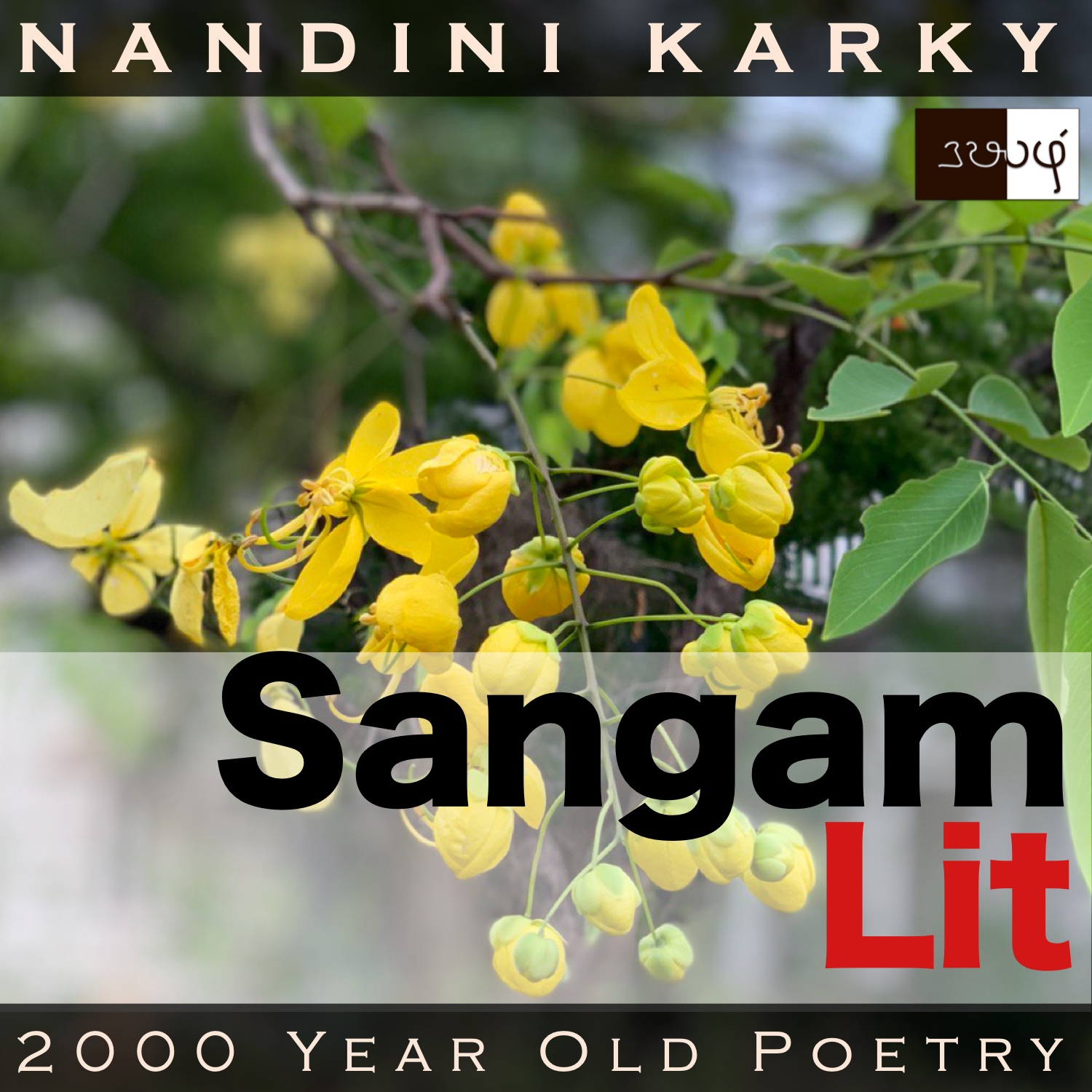Podcast: Play in new window | Download
Subscribe: Apple Podcasts | Spotify | Amazon Music | Android | iHeartRadio | TuneIn | RSS | More

In this episode, we perceive the personification of a tree, as portrayed in Sangam Literary work, Natrinai 296, penned by Kuthirai Thariyanaar. Set in the drylands landscape of ‘Paalai’, the verse speaks in the voice of the lady to her confidante, expressing her angst on receiving the news of the man’s intent to part away.
என் ஆவதுகொல்? தோழி!-மன்னர்
வினை வல் யானைப் புகர் முகத்து அணிந்த
பொன் செய் ஓடைப் புனை நலம் கடுப்ப,
புழற் காய்க் கொன்றைக் கோடு அணி கொடி இணர்
ஏ கல் மீமிசை மேதக மலரும்,
பிரிந்தோர் இரங்கும் அரும் பெறல் காலையும்,
வினையே நினைந்த உள்ளமொடு துனைஇச்
செல்ப என்ப, காதலர்:
ஒழிதும் என்ப நாம், வருந்து படர் உழந்தே.
The verse opens ominously with the words ‘என் ஆவதுகொல்?’ meaning ‘what might happen’, evoking a sense of fear. We glance at ‘மன்னர் வினை வல் யானை’ meaning ‘an elephant skilled at doing the king’s work’, and no doubt, refers to the work of battling! A piece of adornment on the said elephant too catches our eye in ‘பொன் செய் ஓடை’ meaning ‘ornamental plate made of gold’. These words instantly bring to my mind, the temple elephants in Kerala during the Onam festival, and their characteristic yellow plates extending down their trunk. After seeing the animal reference, if you are looking around for the partner-plant, you will not be disappointed for shortly thereafter appears the words ‘புழற் காய்க் கொன்றை’ meaning ‘golden-shower trees with tube-like fruits’. Curiously, the same expression has been employed for this golden delight of a tree in Natrinai 141 as well. From nature, we turn to human nature in ‘வினையே நினைந்த உள்ளமொடு’ meaning ‘a mind that can only think of work’. Sounds familiar? Ancient words to signify a workaholic! Ending with ‘வருந்து படர் உழந்தே’ meaning ‘tormented by suffering’, the verse summons our attention and empathy.
The man and lady had been leading a happy, married life when the man felt compelled to part with the lady in order to gather wealth. Knowing that the lady will take it hard, he approaches the lady’s confidante to pass on the news gently to her. When the confidante relays the news of his imminent parting to the lady, the lady replies, “What will happen, my friend? Akin to the beauty of an ornamental gold plate on the spotted face of a king’s battle-ready elephant, the ‘kondrai’ tree, with long tube-like fruits, blooms decorating the branches of the tree, which stands elevating a tall mountain! This is that difficult season of bloom when those in love suffer if separated. And yet, with a mind that only thinks about his duty, my love says he wants to hasten and leave. And, all I can do is to stay here and suffer the pain of pining!” With these words, the lady expresses how this is a difficult time to be apart and if the man were to persist in his intention to part, there would be dire consequences for her health and life.
Now, for the hidden nuances! The lady starts her response with a downcast voice, wondering out aloud what might happen. After those initial words, she turns to describe a king’s elephant that has been readied for war and the way, a gold plate glows on its face, dotted with white spots. She then presents this beauty-filled element as a simile to the way the ‘kondrai’ trees are bursting forth with golden blooms on the high mountains. The lady reveals that she talks about the full-bloomed ‘kondrai’ trees only to denote that the ‘கார் காலம்’ or ‘season of rains’ was about to start. She qualifies this season as one when lovers wouldn’t think of parting and if they were to part, it is sure to be filled with suffering. Then, she adds, much like people of today, that the partner seems not to think of day or season, with their focus fully on work. The lady says that the man wants to leave with haste and finishes by saying that all that she can do is to remain home and feel the blows of pining.
In this verse, the lady’s words reveal how it was considered then, as the man’s duty to leave home and gather wealth whereas the woman was expected to remain home and bear with the separation. Returning to the scene of ‘kondrai’ trees and their golden blooms, the lady mentions that to say how she has been making her marital home bloom with happiness and if the man were to leave her and part away in the rainy season, akin to those flowers that will fall and die in the rains, the same fate would befall her too. The lady hopes to persuade the man to defer his travel with these gentle and thoughtful words. A song where a tree turns a true friend to the lady by echoing her emotions with its actions!




Share your thoughts...